WASHINGTON (Saving Seafood) -- May 21, 2014 -- Environmental special interest group Oceana made headlines last March with its bycatch report, "Wasted Catch: Unsolved Problems in U.S. Fisheries." Since the report's release, mainstream media publications and other environmental organizations, like the Pew Charitable Trusts, have further presented one-sided coverage of issues regarding bycatch in the United States -- often providing little or no information about the significant and successful efforts taken by many commercial fisheries to curb unintended catch. These omissions of facts are misleading, ultimately providing the public a skewed perspective on U.S. fisheries management.
In their report, Oceana consistently presented the data in a way that magnifies alleged problems with bycatch, while minimizing references to successful and ongoing efforts to address unintended bycatch. The result is a distorted picture of the current state of U.S. fisheries as a whole, and bycatch issues in particular. Not surprisingly, Oceana quickly began heavily promoting this picture as part of its fundraising campaign, referring hyperbolically to "badly managed fisheries" and "badly enforced regulations." In a recent article appearing in various online publications, "The ABC's of Ecosystem-Based Management, Part III," Lee Crockett, Director of U.S. Oceans at The Pew Charitable Trusts, makes similarly strong allegations, equating fishery bycatch to "needless incidental killing of untold seabirds, whales, and other marine life." A closer examination of such findings, and omissions, reveals that the situation is more complicated and less dire than these groups' misleading reports have led readers, radio listeners, and television viewers to believe.
Read the full story at Saving Seafood>>






